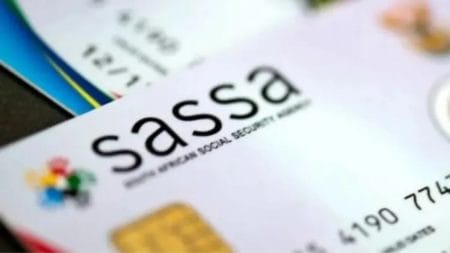Receiving a South African Social Security Agency (SASSA) grant can provide a vital safety net for individuals and families in need, but there may come a time when you need additional financial support. For some, taking out a loan could seem like a viable solution. However, it’s crucial to understand that borrowing while on a SASSA grant comes with both opportunities and challenges.
In this article, we’ll explore everything you need to know about taking a loan while receiving a SASSA grant, including eligibility requirements, loan options, risks, and alternative financial support.
Can You Take a Loan While on a SASSA Grant?
Yes, it is possible to take a loan while receiving a SASSA grant. However, there are important considerations to keep in mind. Although SASSA itself does not provide loans, beneficiaries can access loans through registered lenders such as Shoprite, Capitec Bank, and Finbond. These lenders cater to individuals with fixed or limited incomes, offering microloans, personal loans, and short-term loan products.
Key Points to Consider Before Taking a Loan
SASSA Does Not Provide Loans Directly
The primary role of SASSA is to administer social grants for South African citizens in need. SASSA does not issue loans but provides guidance to grant recipients on how to approach registered lenders. To access a loan, you will need to engage directly with banks or financial institutions that offer loan products to people with regular income sources, including SASSA grants.Eligibility Requirements for Loan Applicants
Lenders will assess your eligibility for a loan based on a few key factors. As a SASSA beneficiary, you need to ensure you meet the following general requirements:A valid South African ID.
An active bank account to receive funds.
Proof of income, which can include your SASSA grant statement as well as any other regular income.
Additional documents such as recent bank statements and proof of residence.
These documents help lenders assess your ability to repay the loan without compromising your basic living needs.
Loan Options Available to SASSA Grant Recipients
Different financial institutions offer various loan products. Here’s a look at some common loan options that may be available to you:Shoprite Loans: Shoprite, in partnership with its financial services, offers unsecured loans with relatively low interest rates. They focus on simplicity and accessibility, requiring documents like a valid ID, proof of residence, and three months’ worth of bank statements.
Finbond Loans: Finbond is another popular option for loan seekers. They provide both short-term and long-term loans that range from R500 to R20,000. The loans come with fixed interest rates, and repayment terms can stretch up to two years, allowing for more flexibility.
Capitec Loans: Capitec Bank offers loans of up to R250,000, depending on the applicant’s creditworthiness. While these loans come with competitive interest rates, Capitec also offers optional credit insurance to protect borrowers. Applications can be processed easily through the Capitec app, which enhances convenience for recipients.
Affordability and Loan Repayment
One of the most critical factors when taking a loan while on a SASSA grant is your ability to repay the loan without causing undue financial strain. In accordance with South Africa’s National Credit Act, all lenders are required to assess whether the borrower can afford the loan repayment. This means they will evaluate your income (including the SASSA grant), monthly expenses, and overall financial situation before approving the loan.
While the modest amount provided by a SASSA grant may restrict the loan amount you qualify for, the affordability assessment aims to prevent over-indebtedness. For example, if you are applying for a loan of R5,000, the lender will consider how much of your grant is left for other living expenses after the loan repayments.
However, because SASSA grants are generally small and intended for essential living expenses, you may find that the loan amounts offered to you are relatively low. This could limit your options if you’re in need of a larger sum.
Risks and Challenges of Borrowing While on a SASSA Grant
While borrowing a loan may seem like an easy solution, it is not without its risks. Here are some critical challenges to consider before applying for a loan as a SASSA grant recipient:
High Interest Rates: Lenders may charge higher interest rates for borrowers who have limited or fixed incomes, as they are viewed as higher risk. High-interest rates can significantly increase the total repayment amount, making it harder to manage your finances in the long term.
Predatory Lending: Unfortunately, there are some unscrupulous lenders who target vulnerable individuals, including SASSA grant beneficiaries. These unregistered lenders may offer loans with excessively high interest rates or hidden fees that make repayment difficult. Always ensure that you are dealing with a registered and reputable lender.
Over-Indebtedness: Borrowing more than you can afford to repay can lead to a vicious cycle of debt. If loan repayments take up a large portion of your grant, you may find it hard to cover essential expenses like food, electricity, and transportation. This could lead to further financial strain and potential default on the loan, which could affect your credit score.
Negative Impact on Financial Health: If not managed responsibly, borrowing while on a SASSA grant can lead to long-term financial challenges. Missing payments or defaulting on loans could harm your financial standing and reduce your access to credit in the future.
Alternatives to Borrowing
Before taking on debt, it’s wise to explore alternative forms of financial support. Depending on your circumstances, you might find other options that do not carry the same risks as borrowing money. Some alternatives include:
Community Programs and Support: Various local communities offer food assistance, clothing donations, or even emergency relief for individuals in financial distress. Investigate local government initiatives or community organizations for potential help.
Government Subsidies: There are other forms of government assistance available for low-income South Africans, including subsidies for housing, healthcare, and food. It may be worth looking into these options if you need help with specific expenses.
Financial Counseling: Many financial institutions and nonprofit organizations offer free or low-cost financial counseling. These services can help you better manage your money and explore options like debt consolidation or budgeting to reduce financial stress.
Check also: Avoid Loan Scams: Red Flags and Protective Steps Every Borrower Should Know
In conclusion, while it is possible to take out a loan while receiving a SASSA grant, it is essential to approach this decision with caution. Borrowing money comes with both benefits and risks, particularly for individuals on a fixed income. Ensure that you work only with registered and reputable lenders, and be mindful of the interest rates and repayment terms. Always assess your ability to repay the loan without overextending your finances, and consider alternative forms of support before committing to a loan.
Responsible borrowing can provide short-term relief, but it’s crucial to manage your finances carefully to avoid long-term financial difficulties.










